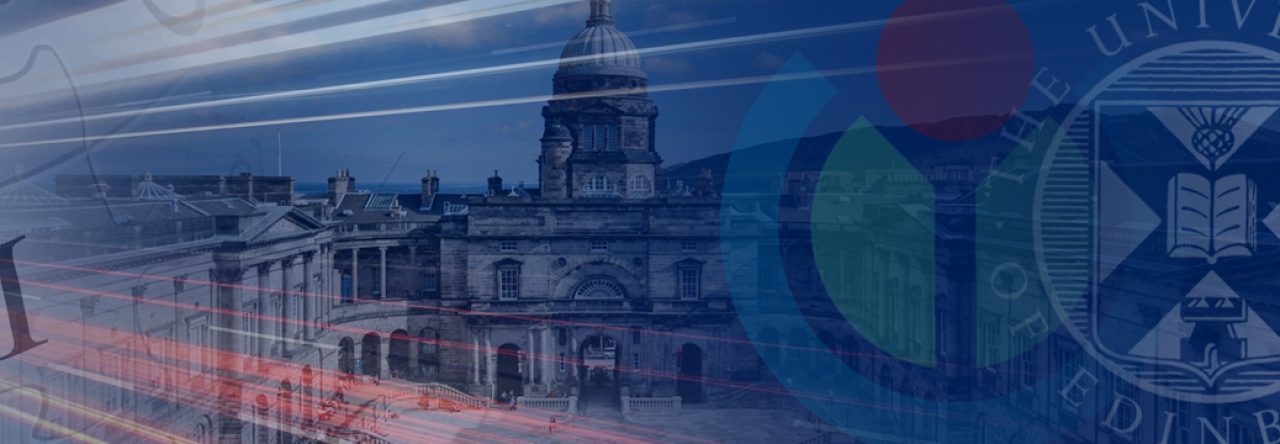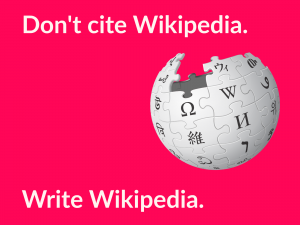Wikipedia: the internet’s favourite website for information
As Wikipedia celebrates its 17th birthday this month, we are once again asking our colleagues to help share some fact-checked knowledge to Wikipedia as part of the global #1Lib1Ref campaign (1 Librarian adding 1 Reference) and help assert that facts, not alternative facts, matter.
The campaign runs from January 15th to February 3rd 2018. Everyone is welcome to participate (it is a global open platform after all).
Wikipedia is already the 5th most visited website, the largest reference work on the internet and the single greatest open education resource in existence today. And that’s with only 120,000 regular contributors. Of whom, only around 3455 are considered ‘very active‘ Wikipedians.
That’s the population of a village like Pitlochry curating the world’s knowledge.
- Imagine if the 13,000 staff and 36,000 at the University of Edinburgh all contributed a little of their time and expertise to improving the free encyclopedia.
- Imagine if ALL universities contributed.
- Imagine if ALL libraries contributed.
While Pitlochry is near the famous 18ft ‘Soldier’s Leap’ at Killiecrankie (worth a visit) #1Lib1Ref is your invitation to take a small step to find out how everyone can help improve Wikipedia. Simply add 1 citation to 1 fact on Wikipedia that has been tagged as needing verified with a ‘Citation Needed‘ tag between now and February 3rd 2018.
The Citation Hunt tool makes it so easy to help share fact-checked knowledge in 5 mins or less. Watch how you can take part (5 mins).
- Read more about #1Lib1Ref campaign.
- Learn about the Citation Hunt tool.
- Step by step guide to taking part from the Biodiversity Library
Oh and don’t forget to save your edits with an edit summary of #1Lib1Ref and #1Lib1RefEdUni if you’re participating at the University of Edinburgh so we can track how many edits are being made.
Let’s see if we can’t add 101 citations to Wikipedia by February 3rd!
Wikipedia at 17 – some facts
- The world’s biggest encyclopedia turned 17 on January 15th 2018.
- English Wikipedia has 5.5m articles (full list of all 299 language Wikipedias)
- 500 million visitors per month
- 1.5 billion monthly unique devices per month.
- 17 billion pageviews per month.
- More reliable than you think
- Vandalism removed more quickly than you think (only 7% of edits are considered vandalism).
- Used in schools & universities to teach information literacy & help combat fake news.
- Guidelines around use of reliable sources, conflict of interest, verifiability, and neutral point of view.
- Articles ‘looked after’ (monitored and maintained) by editors from 2000+ WikiProjects.
- Includes a quality and ratings scale
- 87.5% of students report using Wikipedia for their academic work.
- Used by 90% of medical students and 50-75% of physicians.
- It is the place people turn to orientate themselves on a topic.
Did Media Literacy backfire?
“Too many students I met were being told that Wikipedia was untrustworthy and were, instead, being encouraged to do research. As a result, the message that many had taken home was to turn to Google and use whatever came up first. They heard that Google was trustworthy and Wikipedia was not.” (Boyd, 2017)
“Search is the way we live now” – Google and Wikipedia
- Google depends on Wikipedia. Click through rate decreases by 80% if Wikipedia links are removed.
- Wikipedia depends on Google. 84.5% of visits to Wikipedia are attributable to Google.
- According to 2011 figures in Hillis, Petit & Jarrett (2013), Google processed 91% of searches internationally and 97.4% of the searches made using mobile devices.
- Google’s ranking algorithm also has a ‘funnelling effect’ according to Beel & Gipp (2009); narrowing the sources clicked upon 90% of the time to just the first page of results with a 42% click through on the first choice alone.
- This means that addressing knowledge gaps on Wikipedia will surface the knowledge to Google’s top ten results and increase clickthrough and knowledge-sharing. Wikipedia editing can therefore be seen as a form of activism in the democratisation of access to information.
- Did you know that you can nominate Wikipedia pages to be included on Wikipedia’s front page (viewed 25 million times a day on average)? We did just that for the noted sociologist Mary Susan McIntosh‘s Wikipedia page which was created for International Women’s Day in March 2017. From not having a Wikipedia page at all to 7000 views in 1 single day.
More Did You Know facts about Wikipedia.
Don’t cite Wikipedia, write Wikipedia.
- Wikipedia does not want you to cite it. It considers itself a tertiary resource; an online encyclopedia built from articles which in turn are based on reliable, published, secondary sources.
- Wikipedia is relentlessly transparent. Everything on Wikipedia can be checked, challenged and corrected. Cite the sources Wikipedia uses, not Wikipedia itself.
Wikipedia does need more subject specialists to engage with it to improve its coverage, however. More eyes on a page helps address omissions and improves the content.
Feedback from staff and students who have engaged with editing Wikipedia:
Isn’t editing Wikipedia hard?
Maybe it was a little hard once but not now. It’s all dropdown menus now with the Visual Editor interface. So super easy, intuitive and “addictive as hell“!
Do you need a quick overview of what all the buttons and menu options on Wikimedia do? Luckily we have just the very thing for you.
Want to get started?
- Wiki Basics – step by step guide to getting started.
- Lesson plan – how to run a Wikipedia training session.
More reading
- British people trust Wikipedia more than the BBC, Guardian, Telegraph and Times.
- Your Middle School Teacher was wrong about Wikipedia
- People love Wikipedia: the internet’s favourite website.
- Wikipedia comes of age – The Chronicle of Higher Education
- Students’ use of Wikipedia as an academic resource — Patterns of use and perceptions of usefulness
- Updating Wikipedia should be part of all doctor’s job.
- See the page on Bermuda Triangle to see why reference librarians recommend Wikipedia for pre-researching a topic.
- Where are all the women Wikipedia (Guardian, 2016)
- Editors are trying to fix Wikipedia’s gender and racial bias problem (Huffington Post, 2015)
- Beel, J.; Gipp, B. (2009). “Google Scholar’s ranking algorithm: The impact of citation counts (An empirical study)”. 2009 Third International Conference on Research Challenges in Information Science: 439–446. doi:1109/RCIS.2009.5089308.
- Hillis, Ken; Petit, Michael; Jarrett, Kylie (2012). Google and the Culture of Search. Routledge. ISBN9781136933066.






